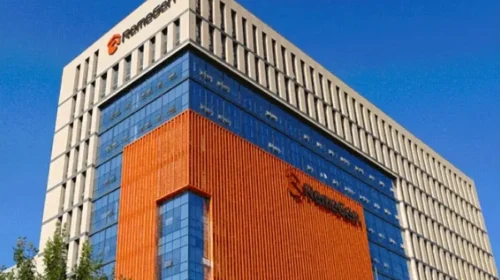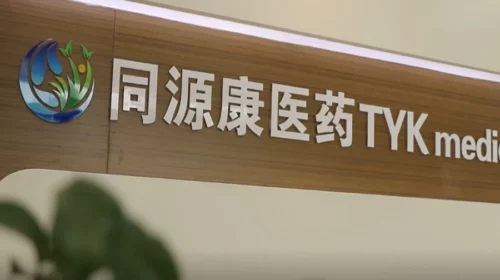Test results for new cancer drug take Akeso investors on wild ride

Shares in the Chinese pharmaceutical company swung back and forth as investors tried to make sense of clinical trial data for an immunotherapy drug billed as a potential world beater
Key Takeaways:
- A Chinese clinical trial has indicated that Akeso’s bispecific antibody is more effective than Merck’s top-selling Keytruda for treating a type of lung cancer, although investors were initially disappointed with the outcome of another study
- The ivonescimab drug been approved for marketing in China and the company has shipped a first batch worth more than 100 million yuan
By Molly Wen
A new antibody injection to fight cancer, developed by a Chinese pharmaceutical company, could be mounting a challenge to the world’s best-selling medicine, which brought in $25 billion last year for its U.S. maker. The investment stakes could hardly be higher.
This helps to explain a drama that unfolded last month for China’s Akeso Inc. (9926.HK), when clinical trial results for its bispecific antibody drug sent the company share price on a stomach-churning roller coaster ride. Investors puzzled over the complex science and commercial prospects for the anti-cancer injection as they struggled to interpret three key pieces of news.
On May 24, Akeso announced that Chinese drug regulators had fast-tracked marketing approval for its ivonescimab antibody injection, fully expecting the stock market to welcome the launch of a potentially money-spinning product. But earlier the same day, the American Society of Clinical Oncology had released interim results from Phase Three clinical trials that, while positive, failed to satisfy high market hopes for the drug.
Investors were torn between bullish and bearish forces. At one point the share price was down more than 40% from the previous close, before bouncing off the day’s low to make up around half the lost ground.
Speaking at an emergency investor call that day, Akeso CEO Xia Yu expressed surprise and dismay at the “abnormal” market reaction to what could be seen as promising findings for the drug.
The battle did not end that day. Akeso’s stock fell 35.9% over four consecutive trading sessions. Then on Friday May 31, the company released results of a comparative analysis of its drug compared with Keytruda, a PD-1 inhibitor made by Merck (MRK.US). In the Phase Three trial on patients with a type of lung cancer, the Akeso drug outperformed the market-leading Keytruda. The results from the Chinese trial marked the first time that Keytruda had been beaten for effectiveness in a clinical study.
Akeso’s share price took off after the news. At one point it was up more than 87%, although the momentum flagged for a closing gain of 37.5%. Shares in its partner company Summit Therapeutics (SMMT.US), which has licensing rights for the drug outside of China, rose a staggering 272% on the day.
The rallies were driven by high expectations of future sales, given that the Chinese drug was pitted against the world’s biggest-grossing pharmaceutical product. In 2023, sales of Keytruda reached $25 billion, after it was approved to treat nearly 40 indications worldwide including multiple forms of cancer.
The sales prospects could be immense if ivonescimab consistently proves itself to be a match for Keytruda, although others caution that Akeso’s head-to-head trial covered fewer than 400 patients suffering from an advanced form of non-small cell lung cancer.
Still, the drug’s potential was recognized early on, when Akeso enlisted partners to help bring it to market. Summit Therapeutics paid $500 million in 2022 for the rights to develop and commercialize the drug in the United States, Canada, Europe and Japan. The total value of the transaction, including development, registration and milestone payments, could be up to $5 billion.
Ivonescimab is a bispecific antibody that fights cancer by blocking proteins and growth factors through the PD-1 and VEGF pathways, boosting the body’s immune response while curbing a tumor’s ability to grow blood vessels. Akeso bills the drug as the world’s first such dual-purpose antibody that has been approved for sale.
In that case, why did the U.S. clinical trial results trigger a stock sell-off on May 24? That trial was conducted on patients with a type of non-small cell lung cancer who carried a gene mutation and had earlier received a targeted inhibitor therapy. The study found that 50.6% of patients responded to the Akeso drug, given alongside chemotherapy, with a median progression-free survival (mPFS) period of 7.06 months over a median follow-up timeframe of 7.89 months. That outcome was better than 35.4% and 4.8 months for a control group given a placebo plus chemotherapy, indicating clinical benefits of using the Chinese drug.
However, market participants did a straight comparison with results from another Phase Three clinical trial for a combined therapy developed by Innovent Biologics (1801.HK) for the same condition, which produced a slightly higher mPFS of 7.2 months, defined as the time during the tracking period that the cancer does not get any worse.
Based on the data, some investors concluded that Akeso’s drug was less effective than Innovent’s therapy of sintilimab plus bevacizumab. But Akeso CEO Xia said it was unreasonable to compare the mPFS figures for trials on patients with different conditions in dissimilar clinical settings.
Turning a profit
Founded in 2012, Akeso now has three approved oncology drugs including ivonescimab. Last year, it made a profit of 1.94 billion yuan ($268 million) from its partnership with Summit. Excluding technology licensing and cooperation income, its net loss for 2023 was 788 million yuan, significantly narrower than a 1.43 billion yuan loss in 2022.
Sales of the first two approved products, the PD-1/CTLA-4 bispecific antibody cadonilimab and PD-1 monoclonal antibody penpulimab, rose 48% last year to 1.63 billion yuan. Sales of cadonilimab, the world’s first approved bispecific antibody for cancer immunotherapy, surged 149% last year to 1.36 billion yuan. Hopes are high that ivonescimab will turn out to be the company’s next bonanza drug. Akeso revealed on May 30 that it had shipped a first batch worth more than 100 million yuan, which would soon arrive at major medical institutions across China.
Akeso’s share price swings in May were unusually extreme, but the market value of pharmaceutical companies can fluctuate with the results of clinical trials. After the market drama, the company’s price-to-sales (P/S) ratio rests at about 7.7 times, lower than the 8.4 times for fellow cancer specialist Innovent Biologics. Investors will need to keep a close eye on the progress of its drugs to assess the appropriate valuation going forward.
To subscribe to Bamboo Works free weekly newsletter, click here






